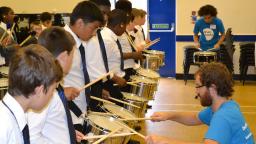As part of Youth Music’s Exchanging Notes programme, 17-year-old Ashley has taken part in one-to-one music-making sessions at school. He’s developed his ability to express himself and amazed teachers with his progress.
Ashley attends Rosewood Free School in Southampton. It’s one of only a few schools in the country which caters specifically for children with profound and multiple learning disabilities (PMLD).
Many of Rosewood’s students have complex additional needs – including physical, visual or hearing impairments – and may only communicate non-verbally, using sounds, signs and gestures rather than words.
As a result, they face a lot of barriers to ‘traditional’ forms of music-making.
For the past three years, Ashley’s school has been working in partnership with SoCo Music Project, a community music organisation also based in Southampton.
Ashley’s class teacher Georgie tells the story of how she’s seen him develop his ability to express himself.
“Ashley came into my class last year,” she recalls. “He’s pre-verbal, he’s on the autism spectrum, and he also has no functioning vision, so there are a lot of challenges in his life.”
Georgie was able to watch video footage of Ashley in an earlier music-making session to see where he’d started out from. This year she’s sat in with SoCo’s specialist music leader Ignacio on some of the one-to-one sessions with Ashley.
“The progress he’s made is phenomenal, especially with communication,” says Georgie. “He’s been able to express himself emotionally in such a way, it’s been really empowering for him.
The music has really moved him forward to thinking ‘there’s a world out there, and it’s not just that insular world that I’m in, it’s out there and it’s a safe world’.
Watch Ashley making music
Watch Ashley interacting and making music with Ignacio (4 mins).
Ashley has a form of echolalia, meaning he tends to repeat noises and words he hears. But Georgie has seen him begin to develop beyond this and articulate himself more expressively, both within and beyond the music-making sessions.
“He’s now able to bring two instruments together,” she says. “He’s really exploring, trying to figure out how to make sounds. His vocalising has changed as well; his range of tone has increased.
“I strongly believe it’s because he built up that confidence to explore with a really safe session. He’s been able to experiment in his own way. It’s been very gradual, through that repetition. It’s about making him feel comfortable and confident.”
It’s empowering him to say ‘this is who I am, I can make this music my way, I can show you my emotions’. It’s absolutely lovely.

Exchanging Notes
Exchanging Notes is a four-year action research programme pioneering new partnerships between schools and music education providers who normally work in out-of-school settings.
